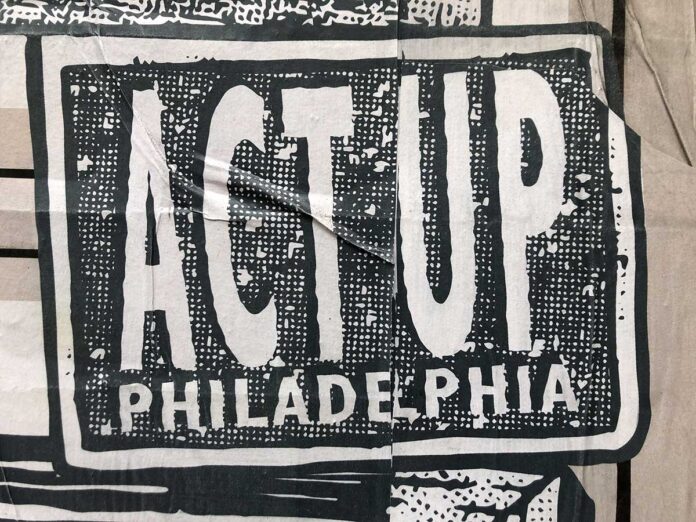Homelessness has long been a persistent issue in the city of Philadelphia, and multiple activism and advocacy groups have been fighting to effectuate substantial changes to the city’s homelessness services system, including the local chapter of AIDS Coalition to Unleash Power, also known as ACT UP.
Since spring of 2021, members of ACT UP Philly have been staging regular, peaceful actions outside of one of Mayor Kenney’s condos in Old City, demanding that more funding be allocated toward permanent, safe, affordable housing for residents experiencing homelessness and housing insecurity.
Over the summer, Office of Homeless Services (OHS) Director Liz Hersh followed up with ACT UP regarding the group’s request for regular meetings.
One of ACT UP’s demands: that people who are unhoused and who have received OHS services be at the helm of the decision-making processes that OHS executes. The City’s housing department currently consults a U.S. Department of Housing and Urban Development-mandated Continuum of Care Board, which has a Lived Experience Commission (LEC) composed largely of people who have formerly experienced homelessness. However, the commission is not being utilized as well as it could be, ACT UP organizer Max Ray-Riek told PGN.
“We don’t feel like the current Lived Experience Commission is a significantly empowered and trained and supported advisory board,” Ray-Riek said. “What we want to see is people who are compensated for their time, trained heavily and supported to be directly involved in important decision-making around staff hiring, policies, planning, budgeting, etc.”
LGBTQ people and queer and trans people of color experience homelessness at higher rates and for longer periods of time than their cis/het white counterparts. Those two groups “are more likely to face housing discrimination, more likely to face employment discrimination, more likely to be surviving on fixed incomes or working in a gig economy and more likely to not have access to a lot of jobs that allow you to afford rent in Philadelphia,” Ray-Riek said. “LGBT and trans people of color spend the longest amount of time homeless [out of] any group in the homeless system by a lot.”
After Hersh reached out, ACT UP leadership put out a call to members who are currently experiencing homelessness or who have received OHS housing services in the last six months to a year, gauging interest in being part of a negotiation team. Then, they held a negotiation training session with local activist Rebecca Subar, who has a background in coaching political advocacy groups and whose work is based on studies of ACT UP. From there, Ray-Riek and three people with lived experience have been meeting with OHS on a monthly basis.
“We highly value the input of people with lived experience,” Hersh said in an email. “They are experts in what it feels like to use our system. We have been very pleased with the meetings with the people with lived experience of homelessness that ACT UP has convened to work with us. They are providing us with critical insights into how they experience our programs and services. We are considering all their ideas and suggestions.”
Members of ACT UP’s negotiation team have a wealth of suggestions for how to improve services for people experiencing homelessness, they told PGN.
“I feel [the meetings] are wavy,” said Stacie Miller, a member of the ACT UP team. “[OHS] doesn’t want to spend any money.”
One amendment to the shelter system that the negotiation team suggested to OHS is to add a new position or replace one of the security guards at each intake center with a staffer who greets incoming people, guides them through the process, answers their questions, helps them store their belongings and informs them of the amenities that will be provided for them.
“We’re not 100% sure that they’re going to do it, but it sounds like they will,” Miller said.
Although the negotiations are in the initial stages, Miller said she would like to see OHS leadership use their budget more efficiently and monitor it more closely.
“I would like to see our human beings who are out there on the street, laying on the ground, trying to get warm over manholes – I’d like to see them off of [the streets],” she said. “They’re human beings. They have a heart, lungs; they bleed. Put them somewhere where they deserve to be treated like humans.”
Kenneth Blackwell, who serves on both the Continuum of Care Board’s LEC and ACT UP’s negotiation team, would like to see more streamlined and efficient processes for people navigating Philadelphia’s homeless services. The negotiation team is working on ameliorating the protocol for situations when someone gets kicked out of a shelter, and how they can go about regaining access.
“When I was in [the shelters] I saw people get kicked out for absolutely no reason,” he said. “They basically opened the doors and said, ‘get out and take all your stuff with you.’ That shouldn’t even be a possibility.”
Blackwell envisions many localized service centers where people facing homelessness can go to get a multitude of services.”
[The OHS] system they have, it’s outdated,” Blackwell said. “That’s my basic focus for when I’m on the LEC — that model that they use to place people where they need to be. For example, some people will need a few services, some might not even need any services, and others might need far more. It’s pretty much guess work now.”
“Being on the negotiation team, it’s good that we can say, ‘why do we have to wait for ‘Code Blue’ to get people off the street,’” said Margaret Beringer, a member of the ACT UP negotiation team and part of the harm reduction team at the human services agency SELF, Inc. “Why does there have to be a weather element to get people indoors?”
Beringer told PGN that down the line, she would like to see an all-inclusive center where people experiencing homelessness can go to seek shelter, take a shower, and access medical and mental health services. “Just envisioning a dream that all these organizations come into collaboration and not be in competition with each other,” she said.
A main barrier to making concrete progress in the area of housing: Mayor Kenney is not at the negotiation table, and he has historically proposed budgets that fail to provide adequate housing solutions for people experiencing homelessness and those at severe risk of homelessness, Ray-Riek said.
Ray-Riek referenced a 2020 report by Pew Charitable Trusts showing that 88% of renters in Philadelphia who make less than $30,000 a year are cost-burdened, meaning that they spend 30% or more of their household income on housing costs, parameters set by the Census Bureau and the U.S. Department of Housing and Urban Development. Sixty-eight percent of Philadelphia renters who make less than $30,000 annually spend at least 50% of their income on housing, which is to say they are “severely cost-burdened,” according to Pew.
Ray-Riek told PGN that he believes there is one way to end the eviction and homelessness crisis in Philadelphia, and that involves the City planning for more housing that people with low incomes can afford.
“None of the City’s development plans adequately target significantly more housing for people making 30% of [area median income] or less, which is the only thing that will get us out of the eviction crisis, out of the homelessness crisis and end that competition where landlords can race to the bottom and keep rents high,” Ray-Riek said. “Solutions like rental assistance and housing vouchers aren’t ultimately going to get us out of there because they continue to empower landlords. Half of the apartments in Philly are controlled by large corporations.”
The members of the ACT UP negotiation team emphasized the fact that housing is a basic right that should be guaranteed to all.
“Being out there in the street, it’s really bad,” Beringer said. “A lot of things happen; you get robbed, you get raped, you get beat. I don’t know how anyone can sleep. Everyone’s path is different. I had a car, I couch surfed, I took live-in positions, but I wouldn’t survive out there. I don’t know how they do it every day, all day.”


